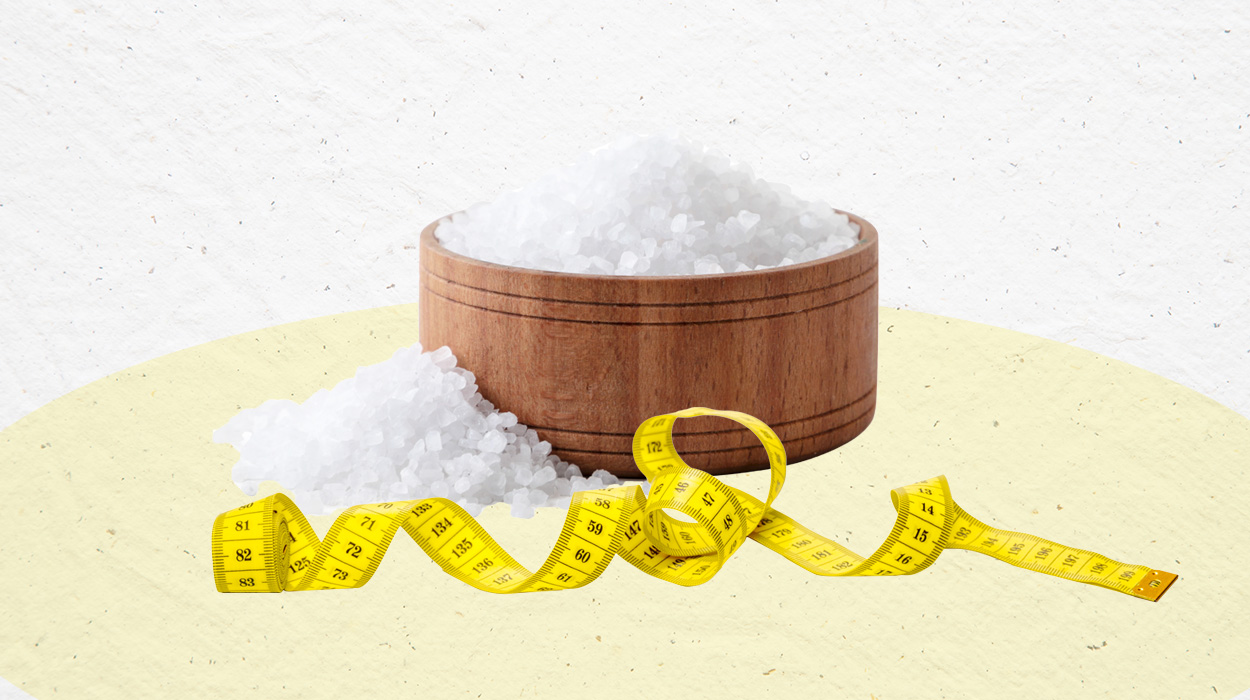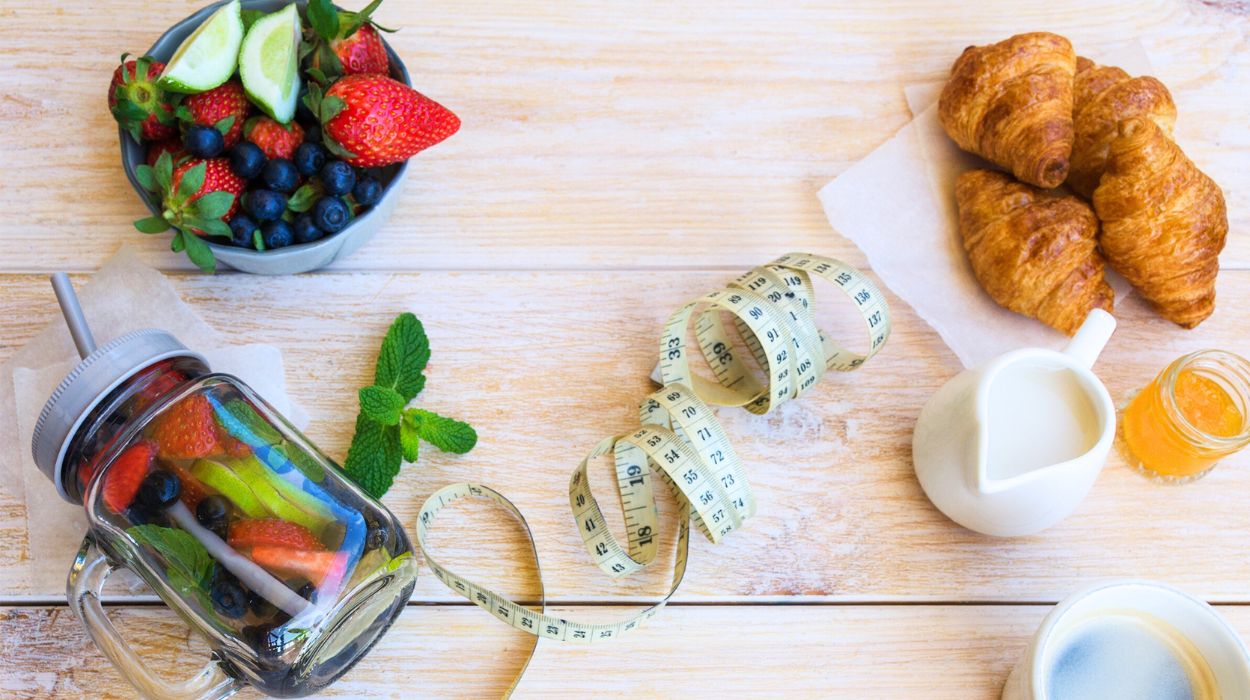 Expert's opinion
Expert's opinion
Expert's opinion
The article is a subjective view on this topic written by writers specializing in medical writing.
It may reflect on a personal journey surrounding struggles with an illness or medical condition, involve product comparisons, diet considerations, or other health-related opinions.
Although the view is entirely that of the writer, it is based on academic experiences and scientific research they have conducted; it is fact-checked by a team of degreed medical experts, and validated by sources attached to the article.
The numbers in parenthesis (1,2,3) will take you to clickable links to related scientific papers.
How Much Sodium Per Day To Lose Weight 2024? Daily Sodium Intake For Weight Loss

There is currently an ongoing debate in the research community about whether regulating daily salt intake can help a person lose weight. Numerous studies support the premise that high salt consumption can lead to hypertension. Moreover with the increase in obesity in the world, studying salt intake and its influence on weight and fat metabolism booster has been gaining much interest. So how much sodium a day to lose weight?
How Much Sodium A Day To Lose Weight?
Sodium is a mineral found in table salt and is necessary for many bodily functions. Our main source of sodium is the food we eat. However, many people are getting more sodium than they need due to the large amounts found in a variety of today’s foods.
The American Heart Association recommends we eat only 1500 milligrams of sodium per day.
The DGA, or Daily Guidelines for Americans, is listed at 2300 milligrams per day.
The CDC reports that the average American eats 3400 milligrams per day! How is this possible?
Does Sodium Make You Fat And Cause Many Health Problems?
“Until now, we have always focused on the effect of salt on blood pressure,” says Jens Titze, MD, associate professor of medicine, molecular physiology, and biophysics at Vanderbilt University in Nashville. “We have to expand our concepts of salt and diet”.
More studies need to be done looking at the role of salt and hunger. According to Professor Titze, people on high-salt diets also become hungrier. Over the long term, that boost in appetite could lead us to overeat and gain weight. Ghrelin is called the “hunger hormone” because it stimulates appetite, increases food intake, and promotes fat storage. How it is involved in high salt intake and appetite needs further study.
Does Eating Salt Make You Gain Weight?
Some studies are now focusing on the roles of fat, high salt weight gain, and the typical American diet. Just look at the popular foods Americans like to eat: snacks, chips, fast food, fried foods, processed foods, and restaurant meals. These are all foods high in salt. In addition, many of these foods are also high in fat and calories. Salty foods can also make you thirsty, which can increase your intake of high-calorie beverages like soda or beer.
Water Retention
It is a proven fact that ingesting too much salt can cause the body to retain water in its attempt to maintain homeostasis. Reducing salt intake releases excess water thus causing weight loss. This weight loss is water loss, however, not fat loss.
High Blood Pressure
In addition to increasing water retention, eating too much salt can cause high blood pressure, heart disease, stroke, and many other health problems. Salt also desensitizes your taste buds which can affect the amount and type of food that you eat. This in turn can cause weight gain, even obesity and insulin resistance[1].

Salt And Obesity
According to the World Health Organization, there are around 2 billion overweight adults worldwide. Of those, 650 million are classified as obese. That equates to 39 percent of adults aged 18 or over who are overweight.
According to the “State of Obesity 2018[2]: Better Policies for a Healthier America”, 39.6 percent of U.S. adult obesity in 2015-2016, and the number increased to 42.4 percent in the 2020 report. This is the first time the national rate has passed the 40 percent mark and further evidence of the country’s obesity crisis. The national adult obesity rate has increased by 26 percent since 2008. Rates of childhood obesity are also increasing with the latest data showing that 19.3 percent of U.S. young people, ages 2 to 19, have obesity.
Recent studies[3] have shown that high salt intake is associated with an increased risk of obesity because many people drink sugar-sweetened beverages to offset the effects of too much salt. This type of body fat accumulates around your middle. When you reduce your salt intake, you lose water but not body fat.
Obesity studies have been done with both adults and children. Results support the relationship[4] between obesity, salt intake, and high-calorie beverages. It is unclear however whether salt intake itself causes obesity or whether a low-salt diet can reduce body fat.
Another study from researchers at Beth Israel Medical Center in Boston however could not prove that salt intake was directly responsible for weight gain. Their results only supported the traditional view that decreasing sodium intake is critical to managing hypertension. Clearly, more studies need to be done in this area.
Your Gut Microbiome And Sodium
In addition to influencing blood pressure, sodium may be involved with the gut microbiome and its influence on fat metabolism. Since healthy body weight is a reflection of healthy gut flora, researchers are now beginning to look at the interactions between the gut microbiome, salt intake, and weight.
The gut microbiome refers to the trillions of beneficial bacteria, viruses, fungi, and other microorganisms that normally inhabit our gastrointestinal tract. These organisms are crucial to our digestive system and to the overall health of our body.
A new study by a research group at Max Delbrück Center for Molecular Medicine in Berlin, Germany shows that high-sodium diets may kill off the beneficial bacteria in our gut possibly setting us up for weight gain. They found that a version of the good bacteria Lactobacillus found in mice is destroyed when they are fed a diet high in salt.
Another study[5] done on mice using a high salt diet in 2019 included the rapid depletion of 90% of Lactobacillus spp. following 14 days of high sodium (5,500 mg/day)diet, indicating a low resilience of the Lactobacillus spp. to sodium.
Conversely, both animal and clinical studies from Harbin, China have shown that some lactobacilli possess an anti-obesity effect by significantly reducing body weight gain through reduced liver lipid accumulation and improved lipid metabolism of adipose tissue. By using mixed lactobacilli supplementation, the researchers[6] could manipulate the gut microbiota and its metabolites resulting in a reduction in obesity.
Tips For Low Sodium Diet To Lose Weight
Avoid Processed Foods

Processed foods are notorious for containing salt and fat that add pounds to your weight if not eaten in moderation. Avoid snacks like pretzels, potato chips, salted nuts, and even some frozen foods. Go for healthy vegetables and low-fat cheese instead.
Lose Water Weight Today
Eight things that you can do to reduce your water retention:
- Reduce the amount of sodium you are consuming in your diet
- Do exercises that make you sweat a lot
- Drink more water
- Reduce carbohydrate consumption
- Limit processed foods and pre-packaged foods in a box, bag, or can because they often contain a lot of sodium
- Purchase and eat daily fresh organic fruits and vegetables
- Read food labels and choose the ones with lower sodium.
- Check labels for “no salt added” or “low sodium”. Labels that say “low-sodium” mean the product has no more than 140 mg of sodium, “very low-sodium” has no more than 35 mg, and “sodium-free” has no more than 5 mg
Burn Off Belly Fat Naturally
- Warm water with lemon in the morning
- Jeera water in the morning
- Garlic in the morning
- Drink plenty of water
- Use coconut oil for cooking
- Eat only natural sugar
- Consume herbs
Try Fat-Burning Drinks to Lose Weight While You Sleep
- Greek yogurt protein shake
- Chamomile tea
- Cinnamon tea
- Soaked fenugreek water
- Turmeric milk
Everyone’s body is different, so how much sodium a day for weight loss will be different for each person. Remember there are two types of weight loss: water loss and fat loss. A healthy, whole-food diet along with good sleep habits and exercise can go a long way toward maintaining a healthy weight and body.
+ 6 sources
Health Canal avoids using tertiary references. We have strict sourcing guidelines and rely on peer-reviewed studies, academic researches from medical associations and institutions. To ensure the accuracy of articles in Health Canal, you can read more about the editorial process here
- Lale Ertuglu, Melis Sahinoz, Aseel Alsouqi, Serpil Muge Deger, Guide, A., Stewart, T.G., Pike, M., Cassianne Robinson-Cohen, Akwo, E., Pridmore, M., Crescenzi, R., Madhur, M.S., Harrison, D.G., Luft, F.C., Titze, J. and T. Alp Ikizler (2023). High tissue-sodium associates with systemic inflammation and insulin resistance in obese individuals. [online] doi:https://doi.org/10.1016/j.numecd.2023.03.024.
- Nih.gov. (2018). The state of obesity: better policies for a healthier America : 2018 – Digital Collections – National Library of Medicine. [online] Available at: https://collections.nlm.nih.gov/catalog/nlm:nlmuid-101739313-pdf .
- Grimes, C.A., Riddell, L., Campbell, K.J. and Nowson, C.A. (2013). Dietary Salt Intake, Sugar-Sweetened Beverage Consumption, and Obesity Risk. [online] 131(1), pp.14–21. doi:https://doi.org/10.1542/peds.2012-1628.
- Juraschek, S.P., Miller, E.R., Chang, A.R., Cheryl A.M. Anderson, Hall, J.E. and Appel, L.J. (2020). Effects of Sodium Reduction on Energy, Metabolism, Weight, Thirst, and Urine Volume. [online] 75(3), pp.723–729. doi:https://doi.org/10.1161/hypertensionaha.119.13932.
- Katarina Smiljanec and Lennon, S.L. (2019). Sodium, hypertension, and the gut: does the gut microbiota go salty? [online] 317(6), pp.H1173–H1182. doi:https://doi.org/10.1152/ajpheart.00312.2019.
- Li, H., Liu, F., Lu, J., Shi, J., Guan, J., Yan, F., Li, B. and Huo, G. (2020). Probiotic Mixture of Lactobacillus plantarum Strains Improves Lipid Metabolism and Gut Microbiota Structure in High Fat Diet-Fed Mice. [online] 11. doi:https://doi.org/10.3389/fmicb.2020.00512.



